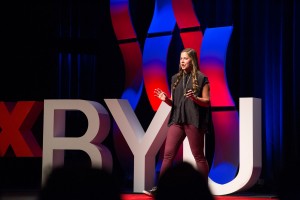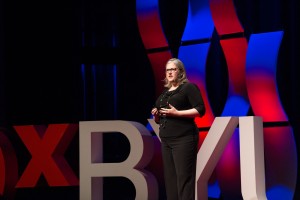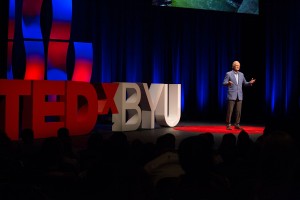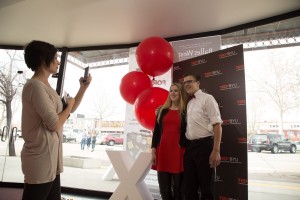
Olympic athletes, grassroots philanthropists, startup businessmen, and other involved individuals and experts of all kinds joined together at the sixth annual TEDxBYU event on Thursday, March 24.
The Covey Center was packed in a sold-out crowd of 700 people. The Peery Program independently organized the organized TED event.
Randall Bell, a socio-economist and CEO of Landmark Research Group, discussed his career as a strategic problem solver. Nicknamed “Dr. Disaster” by the Wall Street Journal for his consultation on the scenes of calamities, Bell addressed the ways that people respond to these types of challenges. He remarked that the individuals who cultivate little rituals or routines— “rich habits,” as Bell put it– were far more likely to thrive when placed in harsh circumstances. Personal, private habits — like reading books, exercising and meditating — correlate strongly with success in life. What’s more, simple outreaching actions like writing thank-you notes or eating dinner regularly as a family result in higher levels of satisfaction and happiness.
Those who make their beds every morning, Bell noted, are “207 percent more likely to be billionaires.” He also encouraged the crowd to use planners or calendars to focus their days. “We do not choose our futures, but we do choose our habits,” Bell said. “And they determine our future.”
Jennifer Nielson, an organic and biochemistry professor at BYU, has spent the last five summers in Uganda facilitating education workshops. Addressing the problem of the relatively few third-world country chemists, Nielson noted that the problem is not the years of chemistry instruction students have, as Ungandans take four to five years of chemistry courses compared to the average one to two of American students.
“Science needs to be taught in real, active and engaging ways,” Nielson said. To demonstrate this, she showed a video lighting a twenty dollar bill on fire. A mixture of alcohol and water, which the bill had been dipped in previously, permitted the flames to encircle the bill while it remained untouched. Demonstrative experiments in classrooms, as opposed to tepid, formulaic teaching, drive up aptitude and attitude in the classroom. “Exploration and experimentation is what lights their minds,” she said.
“Surf photographer. I don’t even know if it’s a real job title,” said Chris Burkard, the next TEDxBYU speaker. In a prerecorded message, he talked about how even a dream job like taking pictures of surfers has “the danger of becoming monotonous.”
To challenge himself, he began traveling to rough, frigid locales and surfing waves that no one else dared. His photographs, often featuring surfers soaked in their wetsuits hunting for the perfect wave amidst flurries of snow and floating chunks of ice evoke from him greater significance because of the sacrifices made to get them. He recalled an extreme blizzard that struck a Norway fjord, plummeting temperatures and giving him hypothermia. “Anything that is worth pursuing requires us to suffer,” Burkard concluded. “I gave a piece of myself in those places.”
Alicia Gettys, communications and operations manager for the BYU Ballard Center, spoke next about the importance of finding good solutions to complex problems. “Problems scream, solutions whisper,” she said, quoting David Bornstein.
To demonstrate the simple power of laughter to impact tough problems, she called on Zach Atherton, director of Improv Broadway, and Daniel Blake, founder of the start-up company Ecoscraps. The two tag teamed their way through an interview on the importance of being self-sufficient and less wasteful, entertaining the audience with quips about wasting perfectly good potatoes– “What’s the point of Idaho if we’re just going to throw away the only good thing to come from there?”– and freestyle rapping about ending food waste.

TEDxBYU speaker was Lisa Delong, an artist and educator from The Prince’s School of Traditional Arts in London. She explained the beauty found in simple geometry, using only circles and lines to create images both intricate and beautiful.
“There’s this amazing correspondence of microcosm and macrocosm,” she said. “[These designs are] mathematical and artistic masterpieces.” She works with children of all ages, helping them to enjoy subject they might otherwise find distasteful or boring.
“I love when they realize they are using geometry as they create art,” Delong said afterwards in an interview. “It’s wonderful seeing their look of surprise.”
Delong was followed by Kate Hansen, a 23-year-old Olympian and current BYU student. She shared her life story with the audience, speaking about her struggles as she competed in the luge and in her training to qualify for the 2014 Sochi Winter Olympics. After breaking her foot shortly before the trials, she continued her training undaunted. Instead of her squats routines, she switched to an all pull-up routine.
“I was absolutely huge. I was gigantic,” Hansen said, showing photos of her workouts to laughs from the audience. In the Sochi Olympics, she achieved Internet fame after videos of her dancing to Beyonce as a pre-race routine went viral. “Be present in who you are. Don’t let your environment change you,” she challenged the TEDx audience.

The final speaker before intermission was Bill Somnerville, a grassroots philanthropist and founder of Philanthropic Ventures Foundation. He prides his foundation’s ability to give money and give it quickly, in immediate response grants (within 48 hours of a request) and paperless giving.
“If there’s a secret to grassroots work, it’s to find someone who can do excellent work,” Somnerville said passionately. “Find them and fund them!”
He listed grants for providing field trips for underprivileged schoolchildren to see the ocean for the first time, supplying science teachers with the supplies they needed for their labs, and other independent philanthropic gestures. Recalling an experience saving a man from drowning using CPR, Somnerville described such grants as the “puffs of life” that the country needs to remain strong and vibrant.
After the intermission,Markus Covert, a distinguished professor of bioengineering at Stanford University, called the nature of such complicated ailments as Alzheimers and cancer a “concurrence of circumstances,” due to the many factors that make the diseases more of a system. His lab has created the first wholesale computer model of a cell, capable of showing metabolism, gene expression, and DNA replication. He credited the partnership of many other labs for this breakthrough, noting that such an undertaking as ending cancer cannot be undertaken alone. “We need to build a system to beat a system,” Covert said.
Following Covert’s remarks, Jeff Clark, a renowned big wave surfer, took to the stage. He recounted his humble beginnings in Northern California, as well as being enthralled with the ocean from a young age. His tenacity and determination served him well when he became as a teenager the first surfer to discover Mavericks, a gigantic an dangerous wave that broke off the California coast. Clark told the crowd in the Covey center that his years of practicing, preparing, making mistakes, and never giving up prepared him for the ride that changed his life. “Realize the dream that I had,” Clark challenged, inviting the audience to tackle whatever insurmountable obstacles they might find in their paths.

“The answer is not in technical ability, it is in character,” said Misan Riwane, co-founder of WAVE Academy in Nigeria. Growing up in that country, she witnessed firsthand the shortcomings of the educational system there and set out to solve the problem of youth unemployment. Calling a university degree often a “proxy” for someone to even be considered for a job, her foundation seeks to train low-income workers in skills like communication, diligence, and taking initiative and then works to place them in the workforce. She has found that on-the-job performance doesn’t necessarily correlate to past job experience or academic degrees; rather, it is determination, hard work, and communication abilities that help workers get ahead.
The final TEDxBYU speaker was Dave Vance, a comedy writer for the TV show Studio C and director of marketing for VidAngel, a successful Utah startup company. “If you want your message to be heard, use comedy,” Vance told the audience. He referenced his own hugely successful online ad campaign of the Squatty Potty, a toilet stool that improves posture. The use of humor in the online advertisements helped increase online sales by 600 percent, though Vance admitted the “very real fear that this will be my legacy.” He remarked on the power of comedy to make the boring interesting, to make controversial topics safe, and to connect the disconnected. “You have a message that can make the world better,” Vance remarked in closing. “And comedy can help you to do it.”
Adriana Ojuka, a Provo resident and student at BYU, came away from the night with a new determination. “Overall, it was so inspiring,” Ojuka said. “It makes me want to go out and change the world.”




